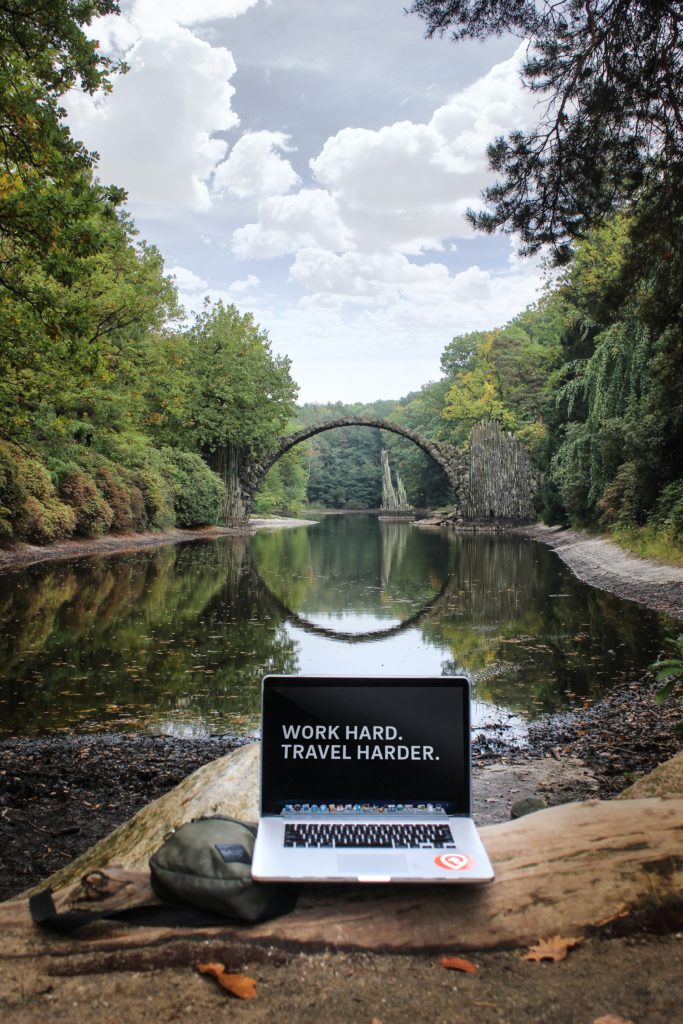It seems to be that these days, everyone wants to be a digital nomad. I came to this conclusion because that’s the number one question I get from people: how can I be a digital nomad, too? Frankly, I have no idea. I am not one. Though I understand why people think I am. I share my writings in the digital sphere and I run part of my Feminine ReWilding mentorship online as well. But I do not consider myself a digital nomad. Though I partially work online and am a nomad, I work locally wherever I am (part time or as work exchange).
While there is no problem with being a digital nomad, and it is actually very appealing with the freedom of working from anywhere or anytime, there are also issues with how one lives this lifestyle. To start, it isn’t always as it seems. Many people have location freedom but their time is not so free—they still work 8 hours a day and probably have shifts as well. I’ve seen many digital nomads who had to get up at 2 a.m. for a conference call or were up all night providing IT support for countries on the other side of the world, but this isn’t glamorous because it is like your normal, everyday job, so many of them don’t show this on their social media.

By now there’s a steady influx of travelers in almost every major city and bigger town, the same people moving around of course. The pollution of the planet grows as more people move around mainly with planes and it also hurts small business and communities.
I heard a story of a yoga teacher friend who moved to Nosara, Costa Rica about 10 years ago and lived there for a few years. It was a paradise for yoga teachers, students, musicians, surfers and healers at that time. The community was small but thriving. He visited back in 2022 and found that the whole place has completely changed. Artists and healers were replaced by rich people, influencers and digital nomads. The prices went up insanely (while even in 2018 a studio apartment would cost $2,400/month, now it costs more than $1,000/week). Spirituality was replaced with luxury, connection with disconnection, personal communication with hanging on the phone, community with individualism. The place wasn’t about yoga, surfing, and healing anymore, but parties, drugs and dating, polluted streets and oceans and creeps on every second corner.
It might seem like an extreme case because it is not happening everywhere, especially if you live in a place like London, where much of these are part of the natural life anyways. But even in less affected places, small businesses get hurt easily, especially if chain stores are getting opened that provide travelers with the same environment that they can rely on everywhere they go. That brings another question: Why would you travel the world to see the different faces, only to go to the same fast food or café chain for the same experience and miss out on the uniqueness of local places?
Think of how long one can sit at a table with their laptop, working, only buying one coffee and occupying a table for four, for several hours. How many families could enjoy their breakfast or lunch but they have to be turned down and the business falls short on money as well.
While it’s an option to rent out a co-working space, many prefer to save up some money—as a cup of coffee is way cheaper than a desk at a coworking space and ambient music is flowing all day. It happens everywhere so many cafés are opening up a special counter for digital nomads where they can sit with their laptop, while they keep their tables free. These cafés are mostly small businesses that barely survived the pandemic and now they have the new wave of working travelers making it hard, when in fact we can do so much to help!
As a digital nomad (or even as a simple tourist) it’s important to ask yourself: How can I support the local community?
If nothing came to mind, here are some of my ways to contribute to the community I am living with at the time:
- Connecting with locals is very important, and by getting to know the people you’ll have more insight on how you can contribute to them.
- Instead of bringing in your own culture or expect the Westernized culture everywhere, try to adapt to the local culture and the way locals live.
- Drink or eat out in one of the many small cafés and restaurants, whether you can use your laptop there or not. Consider leaving a tip, especially if you were satisfied with the service.
- Shop at the farmers’ market and the corner shops instead of supermarkets. Buy locally made produce and homegrown fruits and veggies.
- There isn’t always a coworking space available, especially in small places but you can negotiate with the owners on the rules of how you can work from their café and still help them to keep customers. Try to avoid the place in peak times when most people would come in for lunch or dinner.
- If you are happy with the place, write good reviews about them! If you aren’t, consider that someone might be having a bad day and do not add to it if not necessary.
Maybe one day the big investors will realize that a huge influx of money might create a comfortable, luxury-esque, Instagram worthy lifestyle for digital nomads and influencers but it doesn’t automatically create a vibrant community. I believe our personal duty is to show up for our fellow human beings and communities, especially if they are very open and welcoming towards us, to give back and help them in as many ways as possible.
Get more like this—Sign up for our daily inspirational newsletter for exclusive content!
__
Photo: Manny Pantoja via Unsplash




